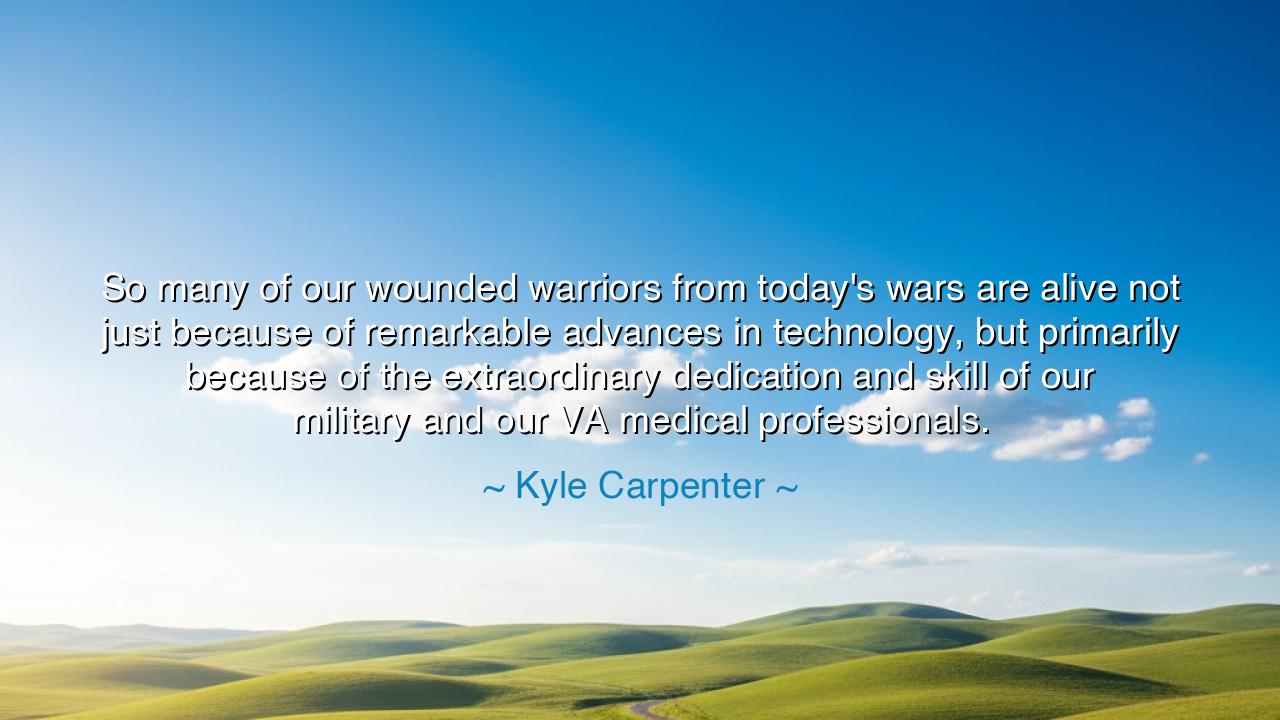
So many of our wounded warriors from today's wars are alive not
So many of our wounded warriors from today's wars are alive not just because of remarkable advances in technology, but primarily because of the extraordinary dedication and skill of our military and our VA medical professionals.






“So many of our wounded warriors from today’s wars are alive not just because of remarkable advances in technology, but primarily because of the extraordinary dedication and skill of our military and our VA medical professionals.”
Thus spoke Kyle Carpenter, a soldier whose body bears the scars of sacrifice and whose soul radiates the light of gratitude. His words are not merely an acknowledgment of progress; they are a hymn to human devotion, to the quiet, tireless hands that mend the broken and breathe life back into those who have walked through the fire of war. In his voice we hear both humility and reverence—a reminder that though machines and medicine evolve, it is still compassion and courage that make miracles possible.
The origin of this quote lies in Carpenter’s own story—one written in blood, pain, and redemption. In 2010, during combat in Afghanistan, he threw himself upon a grenade to save his fellow Marine. The explosion tore through his body, stealing his sight in one eye, fracturing his bones, and burning his flesh. Yet he survived—through hundreds of surgeries, months in intensive care, and years of painstaking recovery at the Walter Reed National Military Medical Center. He, perhaps more than any man alive, understands the meaning of his words: that survival is not only a triumph of technology, but a testament to the unseen heroes—the doctors, nurses, and medics—who wage their own silent war against death every day.
When Carpenter speaks of “remarkable advances in technology,” he honors the tools born of modern science—prosthetics that restore movement, machines that monitor life’s smallest flicker, and medicine that dulls agony and heals infection. Yet his heart is drawn to something deeper—the human spirit that wields those tools with care and purpose. For what use is technology without love? What good is the scalpel without the steady hand, the machine without the soul that guides it? Carpenter’s words remind us that progress may come from invention, but healing comes from dedication.
The ancients, too, understood this balance between art and heart. In the temples of Asclepius, the Greek god of healing, physicians were taught that medicine was both a science and a sacred duty. They tended not only to wounds of flesh but also to the sorrows of the spirit. So it is today, in the halls of our VA hospitals and military wards, where weary men and women, broken in body yet strong in will, are met by healers who treat them with dignity. These modern healers—our nurses, doctors, and medics—carry forward that same sacred flame. They do not see heroes as patients; they see brothers and sisters who have given everything for the safety of others.
Carpenter’s words call us to recognize that the story of war is not only one of valor in battle but also of valor in healing. For each soldier who returns from the frontlines, another battle begins—the battle to reclaim life, strength, and hope. The surgeons who perform the impossible, the therapists who teach the body to move again, the caretakers who sit through the night at a bedside—they are warriors in their own right. Their skill and dedication become the bridge between death and life, despair and recovery. And it is this bridge that Carpenter honors—a bridge built not of steel, but of compassion and endurance.
Consider the story of Clara Barton, the “Angel of the Battlefield,” who tended to the wounded during the American Civil War. She walked through gunfire unarmed, carrying bandages and water, bringing comfort where none could be found. Her courage laid the foundation for what would become the American Red Cross. Barton’s legacy, like the spirit Carpenter praises, shows that healing is itself an act of heroism—a battle for life fought with tenderness instead of arms.
From Carpenter’s reflection, we learn a profound lesson: that the strength of a nation is not measured only by the might of its warriors, but by the mercy of those who mend them. The wise among us must never forget the silent soldiers—the healers—who fight their battles in hospitals, not on fields. Gratitude toward them must not be fleeting; it must be woven into the fabric of our collective soul. Support their work. Honor their sacrifice. Let us, as citizens, ensure that these caretakers of courage have the resources, respect, and recognition they deserve.
And so, let this truth endure for generations: technology may sustain the body, but it is human devotion that restores the soul. The machines of war may break men, but the hands of compassion rebuild them. Kyle Carpenter’s words are both thanksgiving and torch—a light passed to us, that we might remember the sacred partnership between science and service, progress and humanity. Let every soldier, every healer, and every citizen hear it: greatness is not only in the act of sacrifice, but in the grace that follows it.






AAdministratorAdministrator
Welcome, honored guests. Please leave a comment, we will respond soon